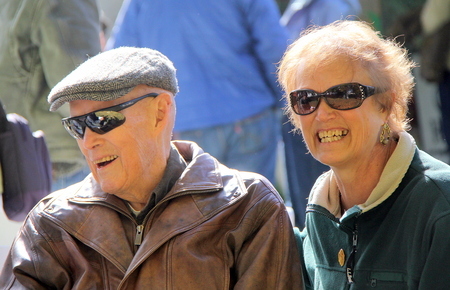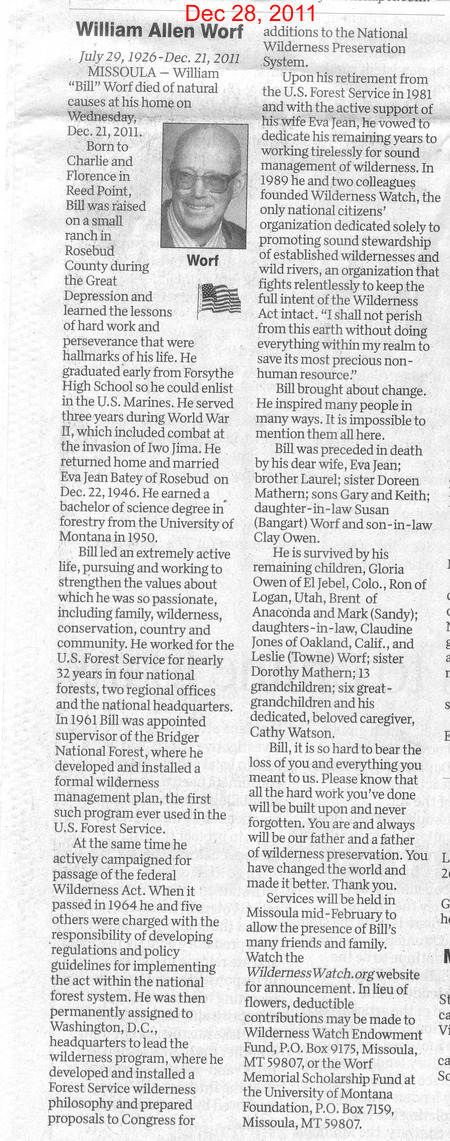Episode 22 : Defining Wilderness : an interview with Bill Worf and Bob Mutch Item Info
In this episode, titled “Defining Wilderness,” Bill Worf, a tireless wilderness champion and lifelong conservationist, tells us in one of his last interviews about his passion for wilderness.
Although Bill passed on December 21, 2011, his legacy will be remembered as long as wilderness survives in this country. He spent his long life working to establish and preserve wilderness as a special, set-aside place where people were not allowed to interfere with Mother Nature. Bill was born in 1926 in Reed Point, Montana, was raised on a ranch near Rosebud during the Great Depression, fought in World War II in Iwo Jima, and then obtained his Bachelor of Science in Forestry in 1950 in Missoula. When the 1964 Wilderness Act was passed, Bill was assigned to Washington DC to lead the wilderness program, and his influence and interpretation were the guiding forces behind the wilderness fire policy of allowing naturally-occurring wildfire to burn, as well as the strict one-launch-per-day river policy, and the use of primitive non-motorized tools by trail maintenance crews.
After retiring from the Forest Service, Bill and his colleagues founded Wilderness Watch, a non-profit organization dedication to maintaining the Wilderness Act in its entirety. As Bill said, “I shall not perish from this earth without doing everything within my realm to save its most precious non-human resource.”
Episode 22 : Defining Wilderness : an interview with Bill Worf and Bob Mutch [transcript]
00:00:00:00 - 00:00:29:15 Debbie Lee: Welcome to the Sawai Bitterroot Wilderness History Project, which is made possible by a grant from the National Endowment for the Humanities. The University of Idaho, and Washington State University. Part of the project’s mission is to collect, preserve, and make public oral histories documenting the history and people of the subway. Bitterroot wilderness. For more information, please visit our website at SPW lib argue Idaho redo.
00:00:29:17 - 00:00:54:15 Debbie Lee: And then I think people, I think people get so much out of being in a wilderness setting once you take away cars and money and telephones, people are different and they are different to each other, I think. And, and, and then they draw on things in themselves that maybe are a little rusty from our crazy life out here.
00:00:54:15 - 00:01:25:11 Debbie Lee: Now, I think the ways that people get along when they’re isolated in a place like that, that they place that they want to be, are really it’s a wonderful thing.
00:01:25:13 - 00:01:51:19 Debbie Lee: Thank you for joining us for the 22nd episode of the Sauer Bitterroot Wilderness History Project. In this episode, titled Defining Wilderness, Bill Wolff, a tireless wilderness champion and lifelong conservationist, tells us in one of his last interviews about his passion for wilderness. Although Bill passed on December 21st of 2011, his legacy will be remembered as long as wilderness survives in this country.
00:01:51:22 - 00:02:13:29 Debbie Lee: He spent his long life working to establish and preserve wilderness as a special set aside place where people were not allowed to interfere with Mother Nature. Bill was born in 1926, in Reed point, Montana, was raised on a ranch near Rosebud during the Great Depression, fought in World War Two in the Jima, and then obtained his Bachelor of Science in Forestry in 1950.
00:02:13:29 - 00:02:37:09 Debbie Lee: In Missoula. When the 1964 Wilderness Act was passed, Bill was assigned to Washington, DC to lead the Wilderness Program, and his influence and interpretation were the guiding forces behind the wilderness fire policy of allowing naturally occurring wildfire to burn, as well as the strict one launch per day river policy and the use of primitive, non-motorized tools by trail maintenance crews.
00:02:37:11 - 00:02:57:18 Debbie Lee: After retiring from the Forest Service, Bill and his colleagues founded Wilderness Watch, a nonprofit organization dedicated to maintaining the Wilderness Act in its entirety. As Bill said, I shall not perish from this earth without doing everything within my realm to save its most precious non-human resource.
00:02:57:21 - 00:03:26:14 Bob Mutch: I guess, Bill, I want to take not just you, but all of us back, like, like 41 years. And you know, you do the math. And that’s 1970. And you remember that I said as well as I do. And it was them. It was the most monumental backpack trip I ever made in my life. Bill. Because it was you and Orville, myself, Dave Aldrich and Biden and Moore, the five.
00:03:26:17 - 00:04:07:11 Bob Mutch: And there we were, up by Cooper’s flat, right, with our tents up in our campfire. Walked in to answer Jimmy’s question. What are we going to do? How do we get started? What’s first? I mean, how do we bring everybody along? It’s something brand new. So now here in 2011, I’d be really interested. As you look back over the last 41 years to what, what you thought on that camp that we had at Cooper Charlottesville, where we were really envisioning the role fire should play in wilderness, and then where we’ve come to over these intervening 41 years to today.
00:04:07:11 - 00:04:16:29 Bob Mutch: In other words, contrast what you wanted to see happen then to where we are today.
00:04:17:01 - 00:04:19:02 Debbie Lee: I think, you know, no.
00:04:19:04 - 00:04:20:25 Bob Mutch: To real question.
00:04:20:27 - 00:04:21:25 Bill Worf: Yeah. What do you where do.
00:04:21:25 - 00:04:25:14 Debbie Lee: You think, Bob? Bob what do you think?
00:04:25:16 - 00:04:35:28 Bob Mutch: Well, yeah. Before what I think. I mean, what are your what are your recollections of our campfire back there and in the wilderness in 70? Bill.
00:04:36:00 - 00:04:41:09 Bill Worf: Oh. Well, you mean as far as,
00:04:41:11 - 00:04:50:15 Bob Mutch: Yeah, just the five of us together around the campfire?
00:04:50:17 - 00:05:27:22 Bill Worf: Well, We knew. I knew you knew that we had to, let Mother Nature play its role. And, And that was our our our goal was to try to, To let that happen. And.
00:05:28:24 - 00:05:29:04 Bill Worf: Yeah.
00:05:29:10 - 00:05:36:25 Debbie Lee: Did you guys have any disagreements? I know you were all of one mind.
00:05:36:27 - 00:05:41:22 Bill Worf: Pretty much. Yeah, yeah, pretty much a one mind.
00:05:41:25 - 00:06:04:22 Bob Mutch: Went through Wilderness Watch Bill and all these years and all your personal engagement after you retired via think, you know, looking in from a wilderness watch perspective that the agency has kind of lived up to what your vision was back then. No. With fire. No, no.
00:06:04:25 - 00:06:12:05 Bill Worf: No, I’m, I’m afraid that, that,
00:06:12:08 - 00:06:24:23 Bill Worf: The agency has, lost track of, What,
00:06:24:25 - 00:06:28:09 Bill Worf: What their mission was,
00:06:28:11 - 00:06:33:17 Bob Mutch: In what way?
00:06:33:20 - 00:06:42:13 Bill Worf: Well, I think we,
00:06:42:15 - 00:06:53:19 Bill Worf: I think we wanted to. To,
00:06:53:21 - 00:07:13:23 Bill Worf: Make, Mother Nature do our thing right? Rather than us letting Mother Nature play its role.
00:07:13:25 - 00:07:17:15 Bob Mutch: We superimpose our values on her natural system.
00:07:17:15 - 00:07:21:07 Bill Worf: That’s right. Yeah, yeah.
00:07:21:09 - 00:07:23:11 Debbie Lee: It’s hard not to do it.
00:07:23:11 - 00:07:27:26 Bill Worf: Is.
00:07:27:29 - 00:07:53:04 Debbie Lee: Thank you for joining us for this episode of the Selway Bitterroot Wilderness History Project, which has been made possible by the National Endowment for the Humanities, the University of Idaho, and Washington State University. The project coordinator is Debbie Lee, recorded and produced by Aaron Jepson.
00:07:53:07 - 00:07:54:29 Debbie Lee: Which.
Gallery
- Title:
- Episode 22 : Defining Wilderness : an interview with Bill Worf and Bob Mutch
- Creator:
- Debbie Lee; Bill Worf; Bob Mutch
- Date Created (ISO Standard):
- 2012-07-03
- Description:
- Interviewees: Bill Worf, Bob Mutch | Interviewer: Debbie Lee | Date: 2011 | Location: Missoula, Montana | In this episode, titled 'Defining Wilderness,' Bill Worf, a tireless wilderness champion and lifelong conservationist, tells us in one of his last interviews about his passion for wilderness.
- Subjects:
- podcasts conservation wilderness act personal recollections administration forest rangers 1964 wilderness act
- Section:
- Wilderness Voices
- Location:
- Selway-Bitterroot Wilderness (Idaho and Mont.)
- Publisher:
- Wilderness Voices, The Selway-Bitteroot Wilderness History Project, https://selwaybitterrootproject.wordpress.com/
- Original URL:
- https://selwaybitterrootproject.wordpress.com/2012/07/03/defining-wilderness/
- Source Identifier:
- Selway-Podcast-ep22
- Type:
- Sound
- Format:
- audio/mp3
- Language:
- eng
- Preferred Citation:
- "Episode 22 : Defining Wilderness : an interview with Bill Worf and Bob Mutch", The Selway-Bitterroot Wilderness History Project, University of Idaho Library Digital Collections, https://www.lib.uidaho.edu/digital/sbw/items/sbw304.html
- Rights:
- Copyright: The Selway-Bitteroot Wilderness History Project. In Copyright - Educational Use Permitted. For more information, please contact University of Idaho Library Special Collections and Archives Department at libspec@uidaho.edu.
- Standardized Rights:
- http://rightsstatements.org/vocab/InC-EDU/1.0/


